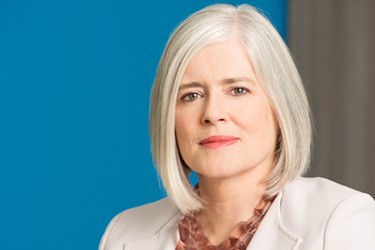Helen Torley's Path To The C-Suite

By Rob Wright, Chief Editor, Life Science Leader
Follow Me On Twitter @RfwrightLSL

“I’m a rheumatologist by training,” reminds Helen Torley, M.B. Ch.B., M.R.C.P, president and CEO of Halozyme Therapeutics. Back in the 1980s, Dr. Torley worked in a hospital-based practice in Scotland. “My practice covered patients with all sorts of rheumatologic diseases [i.e., rheumatoid arthritis, systemic sclerosis, and systemic lupus erythematosus]. As there were few effective treatments for such patients, Dr. Torley soon found herself involved in clinical trials. “I became engaged in trialing new drugs across each of these three diseases to see if we could make a difference,” she explains. One of the programs she worked on involved cyclosporine, and this was where she got to know the team at Sandoz in East Hanover, N.J. “They offered me an opportunity to come to the United States after the Phase 2 data had been read out to lead the Phase 3 clinical program and work on the BLA [biologic license application]. This proved pivotal. Because though she felt she was helping patients every day as a physician, she believed she could help many more by striving to get new drugs approved.
Joining Sandoz in the U.S., she initially worked on rheumatoid arthritis drugs. But early on she found herself moved into an expanded role, testing drugs in transplantation and working with some oncology therapeutics. “I quickly moved up the ranks,” she reflects. And while she recognized the important role she was playing by working on drugs in clinical development, Torley came to understand the important roles played by other aspects of the business. “A lot of the decisions on which drugs to study and which patients to seek benefits for happened on the commercial side,” she explains. “I wanted to learn that aspect of the business, because I aspired to be in a position responsible for setting and driving strategy.” Torley admits the move wasn’t easy and required persistence, as it took about five requests to be “allowed” to move from medical to commercial. “It also took having a sponsor willing to give me an opportunity to see could I successfully make the transition,” she says.
A Formative Leadership Experience For Becoming CEO
Torley transitioned to Novartis, and later spent five years at Bristol-Myers Squibb rising to the role of regional VP of sales. She then joined Amgen, and it was there she recalled an important formative leadership experience. She had been at Amgen for about a year and a half, working as the head of immunology global marketing when George Morrow, Amgen’s EVP of global commercial operations asked her to lead the company’s U.S. nephrology business units. At the time, the business had two products in the market (i.e., Epogen and Aranesp) with annual sales of about $2.5 billion and was preparing to launch the company’s first oral therapy (Sensipar) for patients on dialysis with a condition called secondary hyperparathyroidism. Torley was stunned, as she had no idea she was even being considered for one of the core business leadership roles. “George had witnessed how I worked to bring the inflammation and immunology team together across all the functions within Amgen to develop a cohesive strategy and wanted me to translate that expertise into running the business,” she explains.
The opportunity was her first big profit-and-loss role, which she held for about five years, and during which, she grew the business to over $3.5 billion. “We had many lessons and surprises along the way, such as how to build and lead a team, how to launch drugs, how to navigate a very complex U.S. reimbursement environment, working with CMS, the FDA, and Congress, among many other things,” she notes. “I believe this to be the experience that best prepared me for being a CEO.” But Torley’s experience with Morrow also shaped her in other ways. “When we talk about developing people, you can’t wait for someone to have all the necessary experience before giving them an opportunity. If they are smart, have lots of experiences, good judgment, and are willing to work hard to learn the role, then the executive sponsor needs to be willing to take a chance to see how someone does,” she concludes.
Helen Torley is the subject of the upcoming January 2019 feature in Life Science Leader, “How Halozyme’s First-Time CEO Financed Drug Development.” Be sure not to miss this informative article by becoming a subscriber today.
